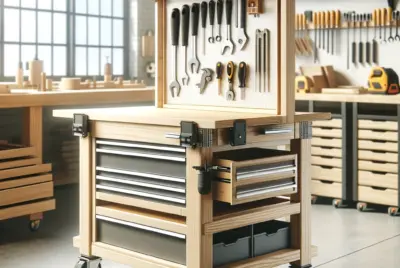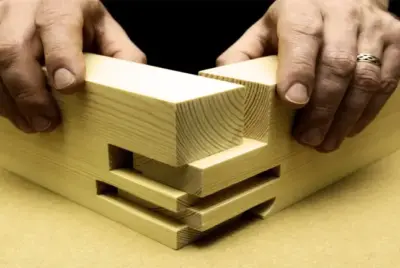Woodworking Workshop Guide: Projects & Tips
Dive into the realm of woodworking workshop where the aroma of fresh timber intertwines with the pride of handcrafted creations. Whether you are an expert or a novice, this guide offers a wealth of knowledge, advice, and project suggestions to ignite your creativity. Let’s begin and transform those wood shavings into stunning artistic expressions!
Why Pursue Woodworking?
Ever gazed upon wooden furniture and pondered, “Could I build this?” You’re in good company. Woodworking transcends a mere pastime; it is an exploration into the core of inventiveness, turning mundane wood into works of utility and aesthetic.
Setting Up Your Woodworking Workshop
Prior to diving into cutting and smoothing, let’s discuss the ideal setup for your space. A strategically organized area is crucial for a seamless and enjoyable crafting experience.

- Essential Equipment: Begin with the basics – a sturdy workbench, a reliable saw, a drill, and securing clamps.
- Protective Gear: Invest in protective eyewear, hearing protection, and a dust mask.
- Efficient Organization: Arrange your tools strategically; accessible yet tucked away. Utilize pegboards and shelving to your advantage.
Selecting Your Timber
Woods vary greatly in properties and challenges, from the pliable pine to the robust oak.
- Softwoods and Hardwoods: Understand their appropriate applications.
- Eco-friendly Choices: Opt for recycled or sustainably harvested timber.
Beginner Project Ideas
Starting your woodworking path is thrilling, and choosing the right projects is essential. Here are three fundamental projects that enhance skills and bring utility and charm to your environment or local fauna.
The Essential Birdhouse
Benefits for Beginners:
A birdhouse is an ideal starting project due to its simplicity, minimal material requirements, and it teaches basic woodworking skills like measuring, sawing, drilling, and assembling. It also supports your garden’s biodiversity.
Skills and Tools:
You’ll master reading blueprints, precise measuring and cutting, using a drill for entry and ventilation, and basic assembly with nails or screws. Required tools include a saw, hammer or drill, tape measure, and potentially a sander.
Customization Potential:
Birdhouses offer vast possibilities for personalization. Play with various designs, dimensions, colors, and decorative additions like perches or multiple compartments.
A Robust Workbench
- Why It’s Crucial:
More than a project, a workbench is a fundamental asset for all future woodworking projects. It provides a stable base for precise and safe project executions and doubles as a storage and tool station. - Skills and Tools:
Constructing a workbench introduces you to designing and building a sturdy, large-scale item. Skills like material selection for durability, working with larger sizes, and ensuring levelness are developed. Tools typically involve a circular saw, drill, and possibly a router, along with hand tools like clamps. - Personalization Options:
Prioritize functionality, yet there’s space for creativity. Consider adding drawers or shelves for tools, a pegboard for tool hanging, or a vise for stable workpiece support.
Custom Shelving
Why It’s Advantageous:
Shelving is a versatile project suitable for any skill level. It not only organizes space but also teaches about weight distribution and secure mounting. Projects range from basic floating shelves to elaborate bookcases.
Skills and Tools:
You’ll explore different joinery types, ensure shelves are level and properly spaced, and master secure anchoring. Tools might include saws, drills, levels, stud finders, and various fasteners depending on the project complexity.
Personalization Potential:
Adjust the shelving’s size, shape, materials, and finish to suit your décor preferences, whether you prefer a rustic or modern aesthetic.
Advanced Projects for the Dedicated Woodworker
As your skills advance, you may seek projects that challenge your abilities and craftsmanship. Here are two advanced projects: a handcrafted table and a rocking chair, each requiring higher precision and skill.
A Handcrafted Table
Why It’s a Milestone:
Creating a table from scratch is a significant achievement for any serious woodworker. It involves various woodworking aspects from joinery and stability to finishing techniques, resulting in a functional and artistic centerpiece.
Skills and Tools:
This project enhances your joinery knowledge, such as mortise and tenon or dovetail joints, essential for a durable table. Finishing techniques are also honed. Necessary tools might include chisels, saws, routers, planers, clamps, and sanding equipment.
Personal Touch:
Endless design options are available. Choose the wood type, dimensions, style, and unique features like inlays or distinct bases to create a table that fits your space and style.
A Rocking Chair
Why It’s a Challenge: Crafting a rocking chair involves detailed attention and ergonomic understanding to ensure comfort. Curved parts require precise shaping, and the chair’s balance and smooth rocking add complexity.
Skills and Tools: This project improves your ability to create and assemble curved components, useful in many advanced projects. Tools likely include a bandsaw for curves, a spindle sander, and various clamps for assembly. Accurate joinery is crucial for durability.
Personal Touch: Rocking chairs can vary widely in style. This allows exploration of different design elements like rocker shapes, backrest styles, and carved details. Selecting wood type and finish can greatly influence both the aesthetics and comfort of the chair.
The Fulfilment of Woodworking
Woodworking is more than mere wood manipulation; it is a profound medium for personal expression and creativity, offering a blend of challenges and rewards that provide deep satisfaction from crafting by hand. Let’s explore further why woodworking is such a fulfilling activity.

👉Download Your 16,000 Plans
Frequently Asked Questions
What’s the Best Project for a Beginner?
Start simple with projects like a birdhouse, small shelf, or basic box, using essential tools and basic techniques.
How Much Does It Cost to Start Woodworking?
Initial costs can vary; a basic setup with essential hand tools might start under $500.
Can Woodworking Be Self-Taught?
Yes, with numerous online resources and community workshops available, patience and practice are key.
Most Important Safety Tip for Beginners?
Always wear appropriate protective equipment, including safety goggles, dust masks, and hearing protection.
How Can I Find Inspiration for My Projects?
Look online on platforms like Pinterest, browse magazines, or visit stores; inspiration is everywhere.
Caring is Sharing




